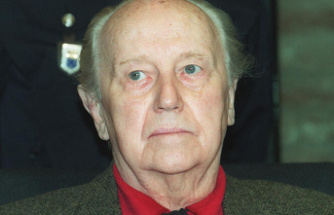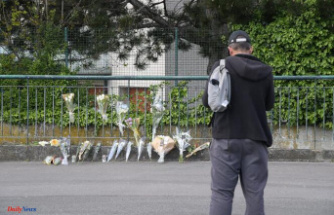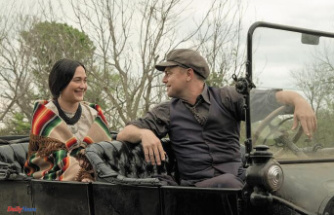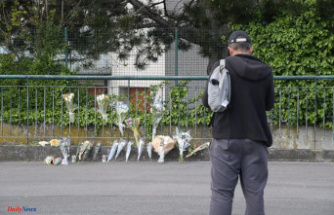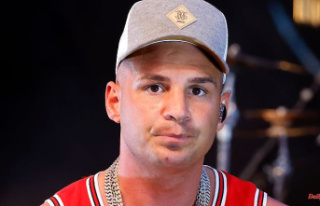Talking to Katy Karrenbauer is like opening a picture book: The actress, who just survived the "Big Brother" container, is not only a great actress, but a gifted storyteller. In her book "I wanted a dog - now I have a father" she tells how she became closer to her father again, because she didn't grow up with him and they weren't particularly close either. But now that the father is slipping into dementia, his wife has died and there is a chance to finally get to know the man who has been a stranger to her for years, Katy Karrenbauer seizes the opportunity. She gives everything - as always - and says in an interview with ntv.de: "If I didn't do it the way I'm doing right now, I could never look in the mirror again." The story of an unusual meeting and late love reads breathlessly.
ntv.de: To come straight to the point - I love your book! Because unfortunately I know exactly what you mean in many places. But as someone who reads a lot of texts, I immediately thought: "Your sentences are incredibly long." But they also take you completely by the hand and lead you into your current life.
Katy Karrenbauer: That's good, that was the plan. Of course, the long sentences were initially noticed and to be honest: I didn't envy the editor that she had to work with me (laughs). You don't write long sentences, I know, but it's about emotions, my emotions. I didn't write the book to make things easier for the reader, I want the reader to understand how I work, what my pressure is, my despair. And you don't feel that when the sentences are offered in short bits. I want those who read my book to go with me into a world that has become my world. And if that's exhausting - then that's just exhausting. Do you always have to pant through a book? Or can you read it again? I guess so.
Your first idea was to implement the topic on film, wasn't it?
Yes, I immediately had Michael Degen and his daughter in mind as the main actors, but unfortunately that's no longer possible because Michael has died in the meantime. But I wasn't thinking about a film when I was writing it, I was thinking about the stories I want to pass on.
Your father is alive - how did that influence your writing?
I can't just disappear behind the stories and talk about "back then", everything has to be right and make sense, because it's also his memory. He also finds answers to his questions in the book. Dementia and Alzheimer's are not comfortable topics, so I can't make the readers comfortable either. Which I usually like to do (laughs).
The subtitle also reads: "How WE retell our story through dementia." Dementia also offers space for involuntarily funny things...
However. I'm going on a reading tour next year, then I'll have to read it out in my own words anyway, in my own way, I want to get that across in an understandable way. That's why I use the present tense in my book. I often move from the past to the now. I'm not afraid to let readers sympathize. Personally, I also want to feel picked up when I read something.
In any case, you can feel very clearly how important the book is to you, how much it reflects your point of view. After all, you write about making bad decisions, fears...
Yes, I cried a lot. I'm like a sea of tears. Since I've been - again - in my father's life, since I took on this role that I have now, I've cried so much you can't imagine. The feeling of not being enough is immense. The feeling of having to make these big decisions - selling a house so you can pay for the care, for example, not being there enough to help - that's a lot. His wife (Editor's note: who is not Katy's mother) died, I took over, also at her request, and I now have to ignore him, say, you need that, you don't need that. That is not easy.
This "playing God" sucks...
Yes, because if you liquidate a "collector's" house, then there is a lot to do. On the other hand, I was able to discover how much my father loved me, always, even though we had little and no good contact for many years. He actually saved every scrap of newspaper about me, every ticket, neatly cut out and glued on. But also my mother's exercise books, old letters, drawings - just so many things that bring him closer to me after all these years. But the biggest pain, seeing his house slowly turning into nothing or an empty house without carpets and pictures and furniture, I had to keep away from him.
You take a lot away from old people when they have to go to a home, because of course they can hardly take anything with them from their previous lives...
Yes, and you put yourself above them because you determine what that is. I find it hard. From 170 square meters to 19, only a few closets remain. You don't even bring your own mattress into the home because it can't be heavy and it has to be easy to clean. Maintaining dignity is an art.
But you managed it, didn't you?
It was a tough road, you know. But I really wanted his stuff to be around him. However, I very often have the feeling that I am not enough.
My father likes to call his retirement home "an institution": "Do I have to go back to an institution?" he asks …
Mine says: "I'm still in this booth now, but I'd like to go home. Or do I have to go back to solitary confinement?" And then I say he can sleep here again tonight. "It's more comfortable, you're right," he then says, "but who actually owns this bed here?"
Do you then play along or do you tell the truth every time?
It doesn't always work, but of course I try. But when he then wants to drive the car, then it becomes real, then you have to say that the car is sold, the status symbol of this generation.
Car means freedom, independence...
... yes, everything he no longer has now. That is bitter. When it used to happen that he was in danger of losing his thoughts, his wife always helped. But since she's dead, he's completely on his own, and it was only then that I realized how dependent he is, she had simply taken on a lot of things in the past. For example, when we were on the phone, the phone was on loud and she completed the sentences he had started. That annoyed me, of course, this interlude that I perceived as bleating from the background. It was only much later that I realized that it was a help. I could be a dementia consultant by now...
Sometimes you're just busy arranging each other's thoughts, aren't you?
Yes, my father was an architect and spent a lot abroad, so a lot gets mixed up. Well, what he has built in the meantime, my dear husband (laughs). Recently he wanted to check the pipes in his retirement home, he had smelled gas and thought - since he thought he had built the house - that he would rather take care of it personally.
I recently had dinner with my father and his old friends - another old friend's son was also there. I want to say: my role has also changed. I am no longer the daughter, I am the confidant, the caretaker, the secretary. I found the change difficult because I was a daughter for a long time and I liked it.
Of course I didn't have that, because I only got close to my father again in the last few years. He used to take us, my sister and me, to go skiing, but then he just waved us away and just called out, where are you when we crawled down the mountain. I thought that was awful. He just wasn't someone who was good with children. Now and then he says thank you, not always by a long shot, but it doesn't have to be, but when he says thank you, it's always great cinema (laughs). Sometimes he even says he missed me or loves me. On the other side he asks where is the woman who always gets the fresh fruit and flowers...
And that is you …
Yes of course. And then he tells me how proud he is of "our Kleene", so am I.
I'm every woman!
However, finally! (laughs) In dementia research, it is said that you should follow the path that a person with dementia takes, because otherwise the flare-ups could be so big. But I told my father that I will always be honest. I told him he had dementia. That broke my heart, but otherwise I would have thought I was not being fair or even taking revenge on him. If he sometimes forgets something, then there is something merciful about it, and if he remembers it, then I'll deal with it at that moment.
By the way, you have to think about yourself too.
That's true, but I've decided that I'll take my dad out into the fresh air as much as possible, that he's clean and that his clothes are neat. That he gets fruit, that he is entertained. He is still very cosmopolitan, and the fact that we use wheelchairs makes us mobile. By the way, it becomes clear how the perspective changes from a standing person to one who is always sitting. Who has to rely on the other. Sometimes he dreams that he rolls in front of a bus or is practically tipped out of the wheelchair.
Incidentally, it's crazy how poorly our environment is still equipped for wheelchairs, prams, walking aids...
Unbelievable, yes, no benches for the elderly, high curbs, so many things could be improved. This world is no longer made for old people.
I definitely know what I don't want to become: old and dependent.
(laughs) We don't choose that. Sometimes you have to wonder what it will be like for you one day, especially if you don't have children. It's different for me because I learn so much from my father, because now I know better why I am the way I am. Because now I'm really getting to know my father. I now know stories from my first seven years, I'm really grateful for that. You have to ask everything now, at some point it's no longer possible.
what do you wish for
I wish that the elderly who rebuilt this country can grow old with dignity. There's no harm in being a little humble. That young people are more attracted to social professions, that these professions are better recognized and paid, that there might be a social year.
What's the worst thing in the home?
The cries of the others, behind the closed doors, calling for help: "Is there nobody there?" If I didn't get my father out of there now and then, I'd never be able to look in the mirror again.
What's next?
We celebrate Christmas together, and if things go well, then even when he's 100 and I'm 70 (laughs).
Sabine Oelmann spoke to Katy Karrenbauer
(This article was first published on Wednesday, December 21, 2022.)


